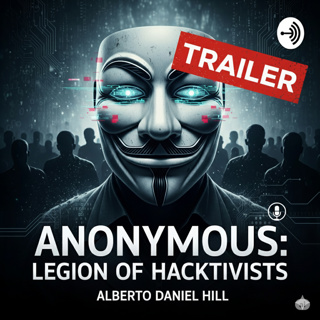
TRAILER: Anonymous: Legion of Hacktivists
The transcript excerpts provide an extensive overview of the hacking collective Anonymous, tracing its origins from the chaotic and often offensive culture of the 4chan b board and the early history of hacker pranks at MIT. The source details Anonymous's evolution from a group focused on "lulz" (laughs) and online trolling to a powerful force in hacktivism, exemplified by large-scale operations against the Church of Scientology and involvement in the Arab Spring by aiding secure communication. It covers the group's decentralized structure, their commitment to freedom of speech and anti-censorship, and the legal repercussions faced by some members, such as a year in prison for one individual involved in the Scientology attacks. Finally, the text explores related groups like LulzSec and the ethical complexities of their actions, including attacks on organizations like WikiLeaks and attempts to stop financial transactions by companies like PayPal and MasterCard.
29 Sep 1min
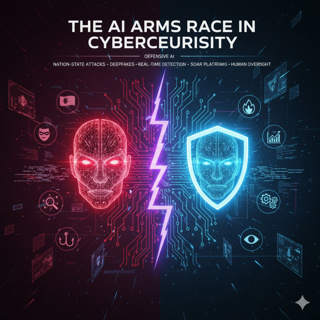
AI in Cyber Threat Hunting and Defense
The collection of sources provides a comprehensive overview of the AI arms race in cybersecurity, detailing how artificial intelligence is leveraged for both offensive and defensive purposes. On the offensive side, sources emphasize that malicious actors, including nation-state groups and cybercriminals, are increasingly using generative AI to create highly sophisticated attacks, such as personalized phishing emails, autonomous polymorphic malware, and convincing deepfakes that lead to massive financial fraud. Conversely, the sources highlight the critical role of defensive AI in countering these threats through methods like real-time anomaly detection, behavioral analytics, and Security Orchestration, Automation, and Response (SOAR) platforms that automate threat detection and incident response. Furthermore, several texts stress the importance of robust AI governance, adversarial training, and human oversight to mitigate inherent technical and operational risks, such as jailbreak vulnerabilities and the production of unreliable outputs, ensuring that AI remains an asset in the evolving security landscape.
28 Sep 7min
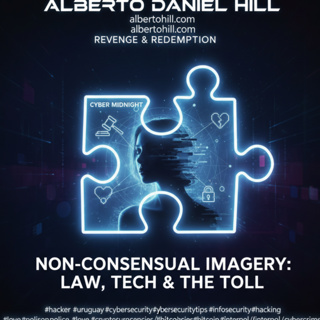
Image-Based Sexual Abuse: Global Analysis and Legal Responses
These sources collectively provide a comprehensive overview of the issue of non-consensual intimate imagery, often termed revenge porn, focusing on its legal, psychological, and technological dimensions. The materials explain that victims frequently suffer severe mental health consequences, including symptoms consistent with PTSD, anxiety, and depression, often leading to a loss of trust and self-esteem. From a legal standpoint, the sources confirm that all 50 U.S. states now have criminal laws addressing nonconsensual distribution, although a Reddit thread suggests that obtaining a conviction without concrete evidence of dissemination can be extremely difficult. Furthermore, the documents detail the global legislative response to this problem, noting criminalization efforts in countries like Canada, Australia, and Spain, and highlight the use of technological solutions like StopNCII.org to prevent the online spread of intimate images via digital fingerprinting. Finally, the texts discuss the disproportionate impact of this abuse on younger adults, women, and marginalized groups, emphasizing that it functions as a tool of gendered violence.-------------------Alberto Daniel Hill https://albertohill.comhttps://cybermidnight.club#hacker #uruguay #cybersecurity #cybersecuritytips #infosecurity #hacking #police #prison #love #cryptocurrencies #bitcoin #interpol #finland #cybercrime
28 Sep 6min

The Anti-Podcast Empire: An In-Depth Analysis of the Cybermidnight Club Phenomenon
Introduction: The Prolific Ghost of PodcastingIn the modern media landscape, the Cybermidnight Club presents a compelling paradox: a media entity boasting a vast library of nearly 600 episodes and a relentless daily output, yet it remains a virtual ghost on traditional podcast charts. It is a prolific phantom, generating a constant stream of content that cultivates a fiercely loyal community while eschewing conventional metrics of success. This analysis will deconstruct the enigmatic success and strategic challenges of this unique "anti-podcast," a model built not on polished production but on a philosophy of raw, iterative creation.At the center of this universe is its architect, host, and "main character," Alberto Daniel Hill. His personal story is not merely a backstory; it is the foundational narrative upon which the entire media brand is constructed.The objective of this document is to analyze the unconventional strategy, the radically efficient content engine, and the dedicated community that define the Cybermidnight Club. By dissecting its operations through the lens of a specific creative philosophy, we will culminate in an evaluation of its greatest strategic dilemma. We begin with the foundational element that informs every aspect of the brand: the personal history and mindset of its creator.--------------------------------------------------------------------------------1. The Architect and The Narrative: Alberto Daniel HillTo understand the Cybermidnight Club, one must first recognize that it is not just a podcast but a platform for its central figure, whose entire operation is the living embodiment of the "hacker mindset." This mindset—defined by a "deep curiosity" into how systems work, a "healthy dose of skepticism" towards assumptions, and an ability to "embrace failure as an opportunity to learn"—is the analytical key to the entire brand. His personal history is the foundational pillar that provides its narrative gravity.Hill is a cybersecurity expert from Uruguay whose personal narrative is inextricably linked to his content. He was reportedly the first person in his country to be imprisoned for a computer crime—a charge he vehemently denies. He has weaponized this personal trauma, transforming it from a liability into the brand's core strategic asset: unimpeachable authenticity. He is not an academic discussing abstract concepts but a survivor critiquing the very systems he has personally confronted.This transforms Hill from a simple host into the "main character" of the media universe he has built—a key strategy in the modern creator economy where a life story becomes the central IP. His personal crusade against the systems and institutions he critiques forms the unifying theme that runs through every broadcast. This fusion of personal mission and professional expertise creates a compelling brand identity, setting the stage for the unconventional, mindset-driven method he uses to broadcast it.https://creators.spotify.com/pod/profile/darkwebtoday/
28 Sep 7min
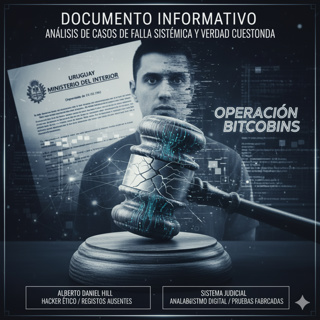
Documento Informativo: Análisis de Casos de Falla Sistémica y Verdad Cuestionada
Este documento sintetiza dos casos complejos que, aunque geográficamente y temáticamente distintos, convergen en la exposición de profundas fallas institucionales, la fragilidad de la verdad oficial y las devastadoras consecuencias para los individuos atrapados en el sistema.El primer caso, denominado "Operación Bitcoins" en Uruguay, detalla el arresto del ingeniero informático y hacker ético Alberto Daniel Hill. Este caso presenta dos narrativas diametralmente opuestas: la de las autoridades, que lo retratan como un ciberdelincuente pionero, y la de Hill, que alega ser víctima de una investigación plagada de incompetencia tecnológica, fabricación de pruebas y coerción. El caso se desarrolla sobre un fondo de registros oficiales ausentes o inaccesibles, destacando los peligros de la analfabetismo digital dentro del sistema judicial y el poder de las narrativas alternativas en la era de la información.El segundo caso examina la crisis sistémica en el Departamento de Policía de Englewood (IPD) en California, catalizada por la destitución del oficial Brandon Beak en 2007. La mala conducta de Beak, que incluía encubrir a otros oficiales, fue un síntoma de una corrupción y violencia mucho más profundas, caracterizadas por un uso excesivo de la fuerza y que culminaron en una investigación federal por parte del Departamento de Justicia de EE. UU. (DOJ). El legado de esta crisis se define por una resistencia institucional a la transparencia, manifestada en la destrucción deliberada de archivos de mala conducta, lo que genera dudas sobre la integridad de innumerables casos y plantea la posibilidad de condenas injustas que aún no han salido a la luz.En conjunto, estos análisis revelan cómo tanto la negligencia como la mala conducta deliberada dentro de las instituciones estatales pueden erosionar la justicia, ocultar la verdad y dejar un rastro de vidas destrozadas.
27 Sep 15min
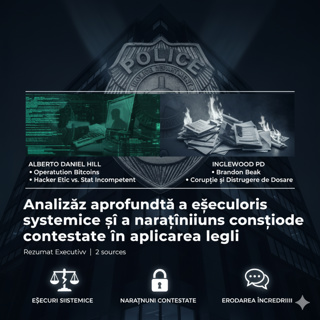
Analiză aprofundată a eșecurilor sistemice și a narațiunilor contestate în aplicarea legii
Rezumat ExecutivAcest document de informare sintetizează două studii de caz distincte, dar tematice, care scot în evidență eșecuri critice în sistemele de justiție penală din Uruguay și Statele Unite. Primul caz, "Operațiunea Bitcoins", examinează arestarea inginerului IT uruguayan Alberto Daniel Hill în 2017, prezentând o discrepanță profundă între narațiunea inițială a autorităților, care îl descria ca pe un șantajist cibernetic periculos, și contra-narațiunea detaliată a lui Hill, care susține că a fost un hacker etic incriminat pe nedrept de un sistem incompetent din punct de vedere tehnic. Al doilea caz analizează criza sistemică din cadrul Departamentului de Poliție din Englewood (IPD), California, declanșată de concedierea ofițerului Brandon Beak în 2007. Acest eveniment a scos la iveală o cultură instituțională profundă a forței excesive, a corupției și a unei rezistențe active la transparență, culminând cu intervenția Departamentului de Justiție al SUA și eforturi continue de a distruge dosarele de abatere disciplinară.Împreună, aceste cazuri ilustrează teme esențiale: pericolele unui sistem judiciar care nu înțelege tehnologia pe care pretinde că o reglementează; impactul devastator al lipsei de integritate și al mușamalizării instituționale; și puterea emergentă a narațiunilor individuale, amplificate de platformele digitale, de a contesta tăcerea oficială și de a remodela percepția publică. Analiza subliniază modul în care eșecurile în garantarea unui proces echitabil, a competenței tehnice și a transparenței pot duce la consecințe catastrofale pentru indivizi și la erodarea încrederii publice în instituțiile menite să o protejeze.
27 Sep 15min
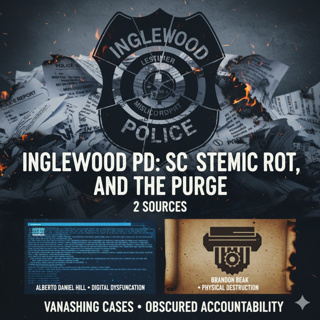
The cases of Alberto Hill and Brandon Beak involve the vanishing or obscuring of official records.
* **Beak's Case (Institutional Cover-up):** * Beak's misconduct (sexual misconduct, covering up for colleagues, landing him on the Brady List) was a catalyst that exposed a **massive systemic crisis** in the IPD (2003–2009), marked by excessive force and constitutional rights violations. * The destruction of records was an attempt to **erase history and evidence** of these problems before the department was legally obligated to release them. This illustrates that the institution was fighting back against attempts to fix its systemic flaws and resisted accountability efforts.### 3. Consequences and Impact of OpacityThe resulting informational vacuum had different effects on the public perception and the legal status of the individuals:| Feature | Alberto Daniel Hill Case | Brandon Beak Case || :--- | :--- | :--- || **Type of Allegation** | Cybercrime (extortion via Bitcoin), which Hill claims was ethical disclosure. | Systemic integrity breach (sexual misconduct, cover-up), landing him on the Brady List. || **Impact of Opacity on Verification** | The official silence created an **informational vacuum** that Hill filled with his detailed counter-narrative, challenging the police triumph story. | The destruction of records created an "information vacuum" that makes it **incredibly difficult to definitively prove or disprove** serious corruption claims (e.g., that Beak was rehired). || **Challenge to Authority** | Hill actively became his own voice, amplifying his story through **international media (podcasts) and social platforms**, thereby challenging official silence and reshaping public perception. | The challenge came primarily from **federal intervention (DOJ)** due to systemic excessive force and external bodies like the ACLU fighting record destruction. |In summary, Hill’s case highlights how **digital incompetence and institutional silence** can be just as effective as intent in losing the truth, allowing his personal story to dominate the vacuum. In contrast, Beak’s case is a crucial part of a larger story where the **institution itself deliberately purged records** to fight transparency and accountability, leading to profound uncertainty about the extent of corruption.
26 Sep 7min






















